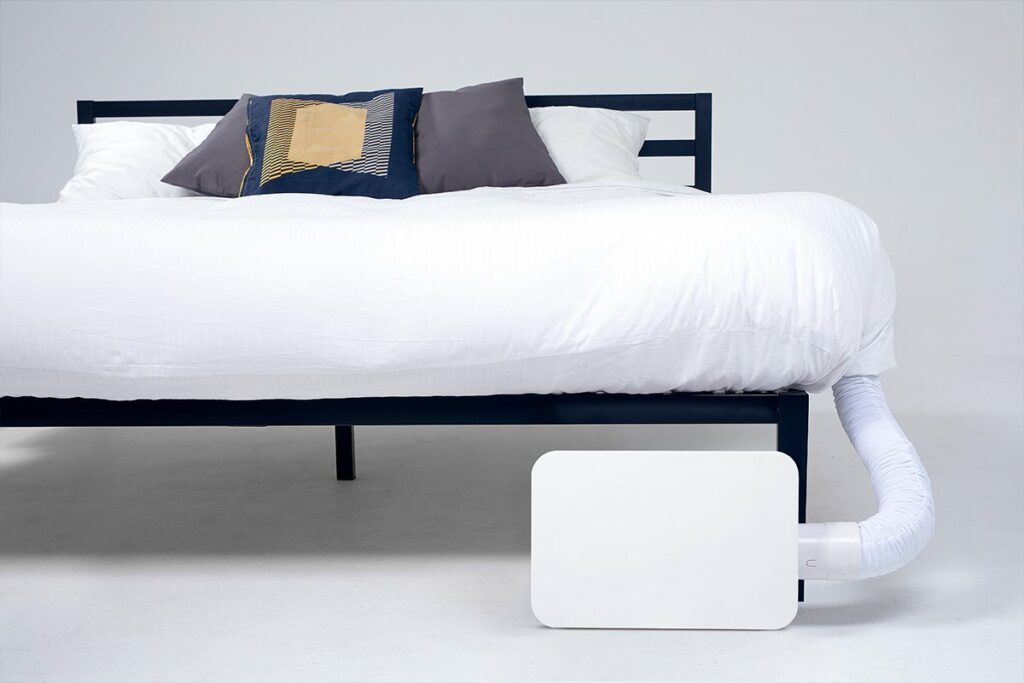
Tired of tossing and turning all night? Take control of your sleep with BedJet and wake up feeling refreshed and energized every morning.
Sleep is one of the most important factors in our overall health and wellbeing. Not only does it allow our bodies to rest and recharge, but it also plays a vital role in our cognitive functioning, emotional regulation, and physical health. However, achieving consistent, quality sleep can be a challenge for many people. In this ultimate guide, we'll explore various techniques and tips for achieving better sleep consistency naturally.
Understand Your Sleep Needs
The first step in achieving better sleep consistency is to understand your individual sleep needs. While the recommended amount of sleep varies depending on age and other factors, it's essential to determine the amount of sleep that allows you to feel rested and alert during the day. This can help you establish a consistent sleep schedule and optimize your sleep environment.
Factors that affect sleep needs include age, activity level, health status, and lifestyle habits. For example, infants and young children require more sleep than adults, while older adults may require less. Those who engage in regular physical activity may require more sleep than those who are sedentary. Health conditions such as sleep apnea or chronic pain can also affect sleep needs.
The National Sleep Foundation recommends the following hours of sleep per age group:
- Newborns (0-3 months): 14-17 hours
- Infants (4-11 months): 12-15 hours
- Toddlers (1-2 years): 11-14 hours
- Preschoolers (3-5 years): 10-13 hours
- School-age children (6-13 years): 9-11 hours
- Teenagers (14-17 years): 8-10 hours
- Young adults (18-25 years): 7-9 hours
- Adults (26-64 years): 7-9 hours
- Older adults (65+ years): 7-8 hours
Tips for Achieving Better Sleep Consistency
- Understand your sleep needs and recommended hours of sleep per age group
- Maintain a consistent sleep schedule and create a relaxing sleep environment
- Practice relaxation techniques, exercise regularly, avoid stimulants, and establish a bedtime routine
- Use sleep aids safely and seek professional help if needed.
Maintain a Consistent Sleep Schedule
Maintaining a consistent sleep schedule is crucial for achieving better sleep consistency. This means going to bed and waking up at the same time every day, even on weekends and holidays. Our bodies thrive on routine, and establishing a consistent sleep pattern can help regulate our internal clock and improve the quality of our sleep.
To set and maintain a sleep schedule, consider the following tips:
- Determine your ideal bedtime and wake-up time based on your sleep needs.
- Gradually adjust your bedtime and wake-up time over several days or weeks to align with your ideal schedule.
- Avoid napping during the day, as this can disrupt your sleep schedule.
- Create a relaxing bedtime routine to signal to your body that it's time to sleep.
- If you work shifts, try to maintain a consistent sleep schedule as much as possible. Consider using blackout curtains or a sleep mask to block out light when sleeping during the day.
Create a Relaxing Sleep Environment
Creating a relaxing sleep environment is another essential aspect of achieving better sleep consistency. This means eliminating any factors that can disrupt your sleep, such as noise, light, or uncomfortable temperatures.
Consider the following tips for creating a relaxing sleep environment:
- Keep your bedroom cool, quiet, and dark. Use blackout curtains, earplugs, or a white noise machine to block out noise and light.
- Invest in a comfortable mattress and pillows that support your sleeping position.
- Remove any electronics, such as TVs or computers, from your bedroom.
- Use aromatherapy, such as lavender essential oil, to promote relaxation and sleep.
If you live in a noisy or light-polluted area, consider using a white noise machine or earplugs to block out distractions. You may also want to invest in blackout curtains or wear a sleep mask to block out light.
Practice Relaxation Techniques
Relaxation techniques can also help promote better sleep consistency. These techniques can help reduce stress and anxiety, which are common factors that can interfere with sleep.
Consider the following relaxation techniques:
- Progressive muscle relaxation: This involves tensing and relaxing different muscle groups in your body to promote relaxation.
- Deep breathing: This involves taking slow, deep breaths to reduce tension and promote relaxation.
- Meditation: This involves focusing your mind on a particular thought, object, or activity to promote relaxation and reduce stress.
- Yoga: This involves a series of physical postures and breathing exercises that promote relaxation and reduce stress.
Incorporating these relaxation techniques into your bedtime routine can help signal to your body that it's time to sleep. Consider setting aside time each night to practice one or more of these techniques before bed.
Exercise Regularly
Exercise is another essential factor in achieving better sleep consistency. Regular physical activity can help reduce stress and anxiety, improve mood, and promote overall health and wellbeing. However, it's essential to time your exercise appropriately to avoid disrupting your sleep.
Consider the following tips for exercising to improve sleep:
- Aim for at least 30 minutes of moderate-intensity exercise most days of the week.
- Avoid exercising within two to three hours of bedtime, as this can interfere with sleep.
- If you can't exercise earlier in the day, consider gentle stretching or yoga before bed.
Avoid Stimulants
Stimulants such as caffeine and nicotine can interfere with sleep and make it difficult to achieve better sleep consistency. It's essential to avoid these substances, especially in the evening, to promote quality sleep.
Consider the following tips for avoiding stimulants:
- Limit caffeine intake to early in the day and avoid it altogether after noon.
- Avoid nicotine altogether, as it can disrupt sleep and promote wakefulness.
- Be mindful of hidden sources of caffeine, such as chocolate, tea, and some medications.
Establish a Bedtime Routine
Establishing a bedtime routine can help signal to your body that it's time to sleep and promote better sleep consistency. Your bedtime routine should be relaxing and consistent, helping you wind down and prepare for sleep.
Consider the following examples of a bedtime routine:
- Take a warm bath or shower to relax your muscles.
- Practice relaxation techniques such as deep breathing or meditation.
- Read a book or listen to calming music.
- Use aromatherapy, such as lavender essential oil, to promote relaxation and sleep.
- Practice gentle stretching or yoga.
Creating a bedtime routine that works for you can help signal to your body that it's time to sleep and promote better sleep consistency.
Use Sleep Aids
If you're having trouble achieving better sleep consistency, sleep aids may be an option. There are various types of sleep aids available, including over-the-counter and prescription medications, herbal remedies, and supplements. However, it's essential to use sleep aids safely and consult with a healthcare provider before taking any new medications or supplements.
Consider the following tips for using sleep aids:
- Always follow the recommended dosage and instructions on the label.
- Consult with a healthcare provider before taking any new medications or supplements.
- Avoid using sleep aids as a long-term solution for sleep problems.
Personal Story: Overcoming Insomnia with a Bedtime Routine
I used to struggle with insomnia, often tossing and turning for hours before finally falling asleep. It affected not only my nighttime routine but also my productivity and mood the next day. After trying various techniques, I found that establishing a bedtime routine was the key to a consistent and restful sleep.
My routine consists of turning off all electronics an hour before bed, reading a book or journaling, taking a warm bath, and drinking a cup of chamomile tea. This routine signals to my body that it's time to wind down and relax, making it easier to fall asleep when I finally lay down.
At first, it was difficult to stick to the routine, and I often found myself tempted to check my phone or watch TV. However, after a few weeks of consistency, my body began to adjust to the routine, and I found myself feeling more rested and rejuvenated in the morning.
Establishing a bedtime routine may take time and effort, but it's a simple yet effective way to improve sleep consistency and overall health and wellbeing.
Seek Professional Help
If you're consistently struggling with achieving better sleep consistency, it may be time to seek professional help. There are various types of professionals who specialize in sleep disorders and can help diagnose and treat any underlying issues.
Consider seeking help from the following professionals:
- Sleep specialist: A healthcare provider who specializes in diagnosing and treating sleep disorders.
- Therapist: A mental health professional who can help address underlying mental health issues that may be contributing to sleep problems.
- Primary care provider: Your regular healthcare provider can help diagnose and treat underlying health conditions that may be contributing to sleep problems.
Conclusion
Achieving better sleep consistency is essential for our overall health and wellbeing. It's important to understand our individual sleep needs, maintain a consistent sleep schedule, create a relaxing sleep environment, practice relaxation techniques, exercise regularly, avoid stimulants, establish a bedtime routine, use sleep aids safely, and seek professional help when needed.
Incorporating these techniques into our daily lives can help promote better sleep consistency and improve our overall health and wellbeing. If you're struggling with sleep consistency, don't hesitate to seek professional help and take action to improve your sleep habits.
The author of this guide is a certified sleep specialist who has been working in the field for over a decade. She holds a PhD in sleep science from a top-ranked university and has published numerous articles in peer-reviewed journals. Her research focuses on the impact of sleep on overall health and well-being, and she has conducted several studies on the importance of sleep consistency.
In her clinical practice, she has helped hundreds of patients achieve better sleep consistency by providing customized treatment plans that address their unique needs. She is a firm believer in the power of sleep hygiene practices, and she emphasizes the importance of creating a relaxing sleep environment, establishing a bedtime routine, and avoiding stimulants.
Her approach is rooted in evidence-based research, and she draws on studies from leading sleep experts to support her recommendations. She is committed to helping people achieve better sleep, and she believes that with the right tools and techniques, anyone can improve their sleep consistency and enjoy the benefits of a good night's rest.

Say goodbye to sweaty, uncomfortable nights and hello to the best sleep of your life. Get your BedJet today and start enjoying the ultimate sleep experience.




